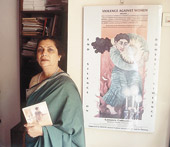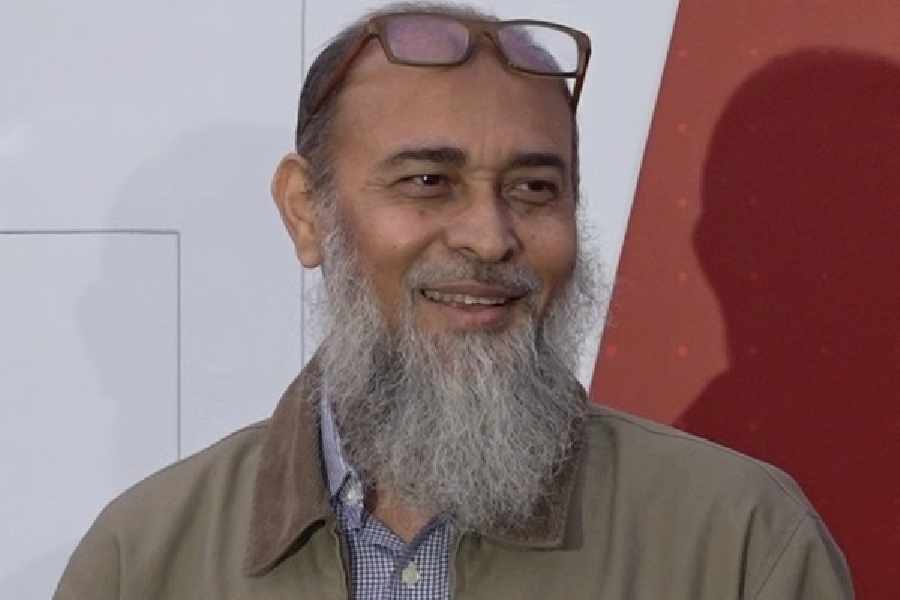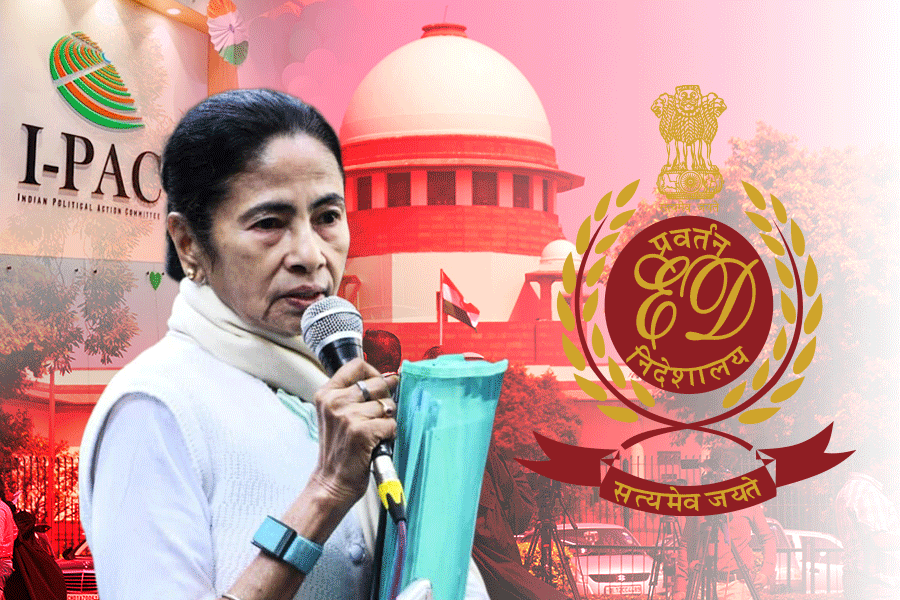 |
| MOVING ON: Rinki Bhattacharya at her Bandra home. Photo: Gajanan Dudhalkar |
Twenty years is a long time to wait for catharsis. But cathartic is how Rinki Bhattacharya describes the experience of awaiting the release of her new book — and her volcanic act of angst — on domestic violence next week. “With this book, I want to give it (her past) a decent burial,” says a much-mellowed Bhattacharya — writer, columnist and documentary filmmaker. For after 18 years of physical and verbal abuse from her husband, and 20 years after she first spoke about it in an explosive interview — bringing domestic violence out of the closet — she is ready to lay her ghosts to rest.
The former wife of filmmaker Basu Bhattacharya was among the first high-profile women to speak out about domestic abuse. Her account was carried in a 1984 interview with senior journalist Madhu Kishwar in Manushi. The interview brought to the fore the ugly side of Bhattacharya, one of ace director Bimal Roy’s promising associates and maker of sensitive films such as the National Award-winning Teesri Kasam, and the trilogy, Anubhav, Avishkar and Grihapravesh.
Rinki Bhattacharya has now edited an anthology on domestic violence, Behind Closed Doors – Domestic Violence in India (Sage Publications, Rs 295) which explores the various complex facets of what is called “the silent crime”. The 234-page book includes interviews with women victims of domestic violence in different parts of the country, apart from analytical articles by her youngest daughter Anwesha Arya, and academics and writers such as Sobha Venkatesh Ghosh, Kalindi Mazumdar and Shirin Kudchedkar.
For Bhattacharya, the book is a culmination of a personal war against domestic violence which began soon after her marriage. One of Bimal Roy’s three daughters, Rinki was born in Calcutta in a joint family. Her family moved to Mumbai when she was nine years old after Bombay Talkies hired Roy to direct a film. Rinki first met Basu Bhattacharya when he was assisting her father for the film, Parakh. She was 17, and completely bowled over by Bhattacharya. So much so that she eloped with him four years later.
“He was very charming and had a way with words. He would visit our house frequently for long chats with my mother. But my family was opposed to our affair. I left my house with just two saris when I married Basu,” recalls Rinki, reclining on a sofa in her pleasantly decorated Bandra house. A painting of Bimal Roy hangs on one of the walls. A number of framed posters of Roy’s women-centric films like Bandini and Sujata adorn the walls sharing space with his classic, Do Bigha Zameen.
Now 62, and a grandmother, Rinki speaks about her experience of domestic violence without bitterness. “It began soon after my marriage. My son Aditya was three months old and was very ill. Basu stepped out of the house to buy medicine, and for seven hours there was no sign of this man. I was crying, thinking something had happened to him. He came back at 9 pm with no medicine,” she recalls. The shocked mother asked her husband where he had been and he erupted. “He began screaming at me. That was perhaps the beginning of the abusive behaviour.”
As Bhattacharya coped with the changes in her life — moving from a liberal well-to-do family into a one-room chawl and becoming a wife and mother — she began to discover a parallel face of her husband. There was, on the one hand, a sensitive and a creative side to the filmmaker whose films focused on strong women in search of an identity. And then there was the man who subjected his wife to frequent verbal and physical abuse.
For Bhattacharya, who was a part of her husband’s crew — helping in scripting, costumes, set and production design — the anomaly was stark. “I think he was one of the most talented directors. Coming from his background, what he achieved was great. But, excessive abusiveness existed like a parallel stream in him,” she says.
Rinki Bhattacharya put up with physical beatings till 1982. One day, 22 years ago, when she was writing an article in her room in their Bandra bungalow, Gold Mist, her husband pounded on her bedroom door, demanding that it be opened. “No doors are going to be locked in this house,” he screamed. He grabbed her by her hair, pulled her into the bathroom and began lashing her with a kimono belt. Rinki’s teenage son Aditya intervened and put a stop to the beating. “That was when I realised how all this was affecting my children,” she says. Bhattacharya decided that she was not going to take it anymore. The next year, she filed for divorce and moved out (though it was only in 1990 that the formal divorce came through).
Why hadn’t she filed for divorce earlier? “Because I had no independent source of livelihood,” she replies. I was writing columns for a couple of newspapers but that was not sufficient for survival. Besides, filing for divorce is a trauma. Family members would tell me to give marriage another try and I was hesitant to go to court.”
“When I realised that this was not my life, I decided to talk about it. Talking works like therapy,” she asserts. She started going to the Women’s Centre to discuss what was till then a guilty secret. “I got so much support from the centre that I joined as a volunteer there,” she says.
Those were difficult days, for many refused to believe her. But Bhattacharya tends to recall the support that she got from different quarters — from psychiatrist-turned-actor Mohan Agashe, filmmaker Satyajit Ray and actor Smita Patil. “Dr Agashe gave me tips on how to deal with Basu’s anger. Manikda wrote me a sympathetic letter after he read the Manushi interview. Smita Patil publicly refused to share any forum with Basu,” she recalls.
As she emerged out of her own shadow, she began to collect books on domestic violence, increase her involvement with the Women’s Centre and help other women in distress with a helpline for battered women. “Women are in constant denial. Many women think suffering is their fate and they internalise it. Unless the victim tries to reach out herself, we cannot help,” she says.
Bhattacharya has also produced a documentary — titled Chaar Diwari (Within Four Walls) — that record the testimonies of domestic violence survivors, exploring its psychological impact on women and children, the lack of legal recourse for women and the societal attitude of regarding it more a “personal affair” than a social problem.
The book has been within her for long years. The idea first came to her in 1984 when she began collecting personal stories of women victims of domestic abuse. Behind Closed Doors contains the raw testimonies of 17 such women. They range from the story of Neela, whose husband dictated everything from which lipstick she should wear to how the food should be served clockwise on a plate, to Hansa who converted to Islam to legalise her bigamous marriage. “But I don’t want just battered women to read this book. We have to try to explain the social structure and contextualise the violence. We have data collected from the JJ Hospital to show the extent of domestic violence. I have not used academic language, to make the book more accessible to women,” she says.
Bhattacharya also believes that it is important to see men who abuse as victims. “You have to look at the abuser in a social context. Basu came from a family where women had never gone to school and wore a ghungat. When he met someone who was city-bred and more sophisticated, he didn’t how to deal with it. I have nothing against Basu. The poor man has suffered in his own way,” she says.
After her husband’s death six years ago and the marriage of all three of her children, Bhattacharya has moved out of the bungalow they shared for two decades, and now lives by herself in a flat in Bandra. With the publication of this book, she wants to move away from domestic violence and explore other issues. She is now compiling a book on eminent women who share their experiences of motherhood. Kamala Das, Shashi Deshpande, Mallika Sarabhai, Neela Bhagwat are some of the women who will feature in her new project.
“It is out of my system now. The book has cleared my mind for other work,” she stresses. The catharsis is complete.










